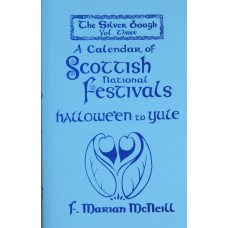Shopping Cart
0 item(s) - £0.00The Silver Bough Volume 3: National Festivals - Hallowe'en to Yule
The Silver Bough is an indispensable treasury of Scottish culture, universally acknowledged as a classic of literature. There is no doubt F Marian McNeill succeeded in capturing and bringing to life many traditions and customs of old before they died out or were influenced by the modern era.
In the first volume of the Silver Bough, the author deals generally with Scottish folk-lore and folk belief, with chapters on ethnic origins, the Druids, the Celtic gods, the slow transition to Christianitiy, magic, the fairy faith and the witch cult. In the three subsequent volumes she explores in more depth the foundations of many of these beliefs and rituals through the Calendar of Scottish national festivals, in which we find enshrined many of the fascinating folk customs of our ancestors. This third volume focuses on the opening seasons of the Calendar of Scottish National Festivals from the Festivals of Spring to the immemorial rites associated with Autumn Harvesting.
As man makes greater and greater advances in the understanding and control of his physical environment, the river between the known and the unknown gradually changes its course, and the subjects of the simpler beliefs of former times become part of the new territory of knowledge. The Silver Bough maps out the old course of the waterway that in Celtic belief winds between here and beyond, and reveals the very roots of the Scottish people’s distinctive customs and way of life.
The Silver Bough is a large and important work which involved many years of research into both living and recorded lore. Its genesis lies, perhaps, in the author’s subconscious need to reconcile the old primitive world she had glimpsed in childhood with the sophisticated modern world she later entered. How much more so can we, today, echo the words of the author:
“I do not believe that you can exaggerate the importance of the preservation of old ways and customs, and all those little things which bind a man to his native place. Today we live in difficult times. The steam-roller of progress is flattening out many of our old institutions, and there is a danger of a general decline in idiom and distinctive quality in our Scottish life. The only way to counteract this peril is to preserve jealously all these elder things which are bone of our bone and flesh of our flesh. For, remember, no man can face the future with courage and confidence unless it is solidly founded upon the past. And conversely, no problem will be too hard, no situation too strange, if we can link it with what we know and love”
F Marian McNeill
Write a review
Your Name:Your Review: Note: HTML is not translated!
Rating: Bad Good
Enter the code in the box below:












